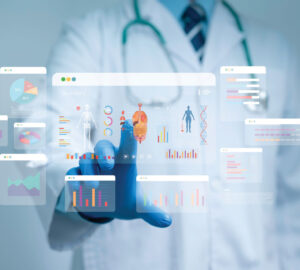Generally speaking, what’s good for your body when you’re not pregnant is good for it when you are. Still, it doesn’t hurt to get a refresher on habits that can help make the stages of pregnancy run smoothly from conception to delivery. Whether you’re planning for a baby, already expecting or welcoming your brand-new family member, doctors have some helpful, healthful advice.
getting pregnant
Dr. Megan Mohrman, an obstetrician and gynecologist at St. Luke’s Hospital, says proper nutrition is one of the first topics she brings up with patients who want to become pregnant. She says women looking to conceive need a well-balanced diet that includes fresh fruits, vegetables and lean meats. “It’s important to make sure your own body is in the best possible shape before you try to get pregnant,” she says. “Talk with your doctor about any underlying health issues like diabetes, thyroid problems or high blood pressure so they can be addressed beforehand.” Here are some other pre-conception points to ponder.
+ Prenatal vitamins are key. They contain essential nutrients like folic acid, which helps prevent brain and spinal cord defects in the baby, and iodine, which is necessary for thyroid development.
+ A healthy BMI (body mass index) is important. Being overweight or underweight can affect your chances of a healthy pregnancy.
– Current medications should be discussed with your doctor. If you are on a drug that isn’t considered safe during pregnancy, you may need to switch to an alternative.
– Tobacco and alcohol should be off limits.
– Certain foods also should be avoided. Fish high in mercury content, raw or undercooked meats, and unpasteurized dairy should be left off your grocery list.
– Stress should be reduced whenever possible. Its effects on fertility are hard to quantify, but some studies have suggested a link between low stress and higher pregnancy rates.
Mohrman says it’s also important to try and avoid getting sick during this stage. You can’t fight off all germs, of course, but staying alert to food safety and hygiene is a good place to start. Pathogens from unpasteurized dairy foods and unwashed produce can cause problems. Also, talk to your doctor about getting a flu shot and any other vaccines you may need.
Finally, Mohrman advises, it’s important to have an established relationship with a knowledgeable and compassionate OB/GYN. “It’s best to see your doctor before getting pregnant,” she says. “But if that’s not possible, your physician can go over the latest medical advice once you’re expecting.”
the bump
Dr. Hamnah Siddiqui, an obstetrician and gynecologist with SSM Health Medical Group, says it’s easy to think of pregnancy as a time when you should ‘eat for two,’ but that’s not really the best train of thought. “A developing baby doesn’t require as much energy as a full-grown person,” she says. “It’s not necessary to double your caloric intake when you become pregnant.” In fact, in the first trimester, no increase usually is needed at all unless you’re underweight, she notes.
Later on, it’s a good idea to boost your calories by 350 per day in the second trimester and 450 in the third. (The average non-pregnant woman needs about 2,000 daily.) “Most expectant mothers feel good using these guidelines,” Siddiqui says. “Calories need to be nutrient-rich from whole, fresh foods such as produce—not extra dessert! You also need a good balance of proteins, fats and carbohydrates. Lean meats like chicken usually are OK because they don’t have too much fat. And try to limit processed foods.”
Siddiqui says it also may be helpful to consume five smaller meals a day instead of three. “If you are having a lot of nausea or acid reflux, five may be the better option,” she notes. “Eating smaller amounts more often also can help distribute your nutrition more evenly.” Staying well hydrated is important, too.
She adds that 25 to 35 pounds is a normal weight gain for the average mom-to-be. “If you’re overweight, 15 to 25 pounds is advisable, and if you’re obese, it’s best not to gain more than 15,” she says. “If you find you’re actually losing weight during the second trimester or later, notify your doctor.”
post-delivery
Once your new family member arrives, it’s natural to want to focus all of your attention on mothering. But it’s just as important to practice good self-care, says SLUCare obstetrician and gynecologist Dr. Shilpa Babbar. She advises paying attention to your body’s signals and returning gradually to a normal routine so your tissues have time to heal.
» exercise. “There’s no magical date for a new mother to return to physical activity,” Babbar says. “Women who deliver vaginally can resume activity when they feel ready and healthy. C-section patients should take at least two or three weeks to heal before starting moderate exercise.
» weight. Babbar advises patients to return to their pre-pregnancy BMI gradually over a six- to 12-month period.
» breastfeeding. It can help accelerate post-delivery weight loss, and it’s recommended for other reasons like maternal-infant bonding, nutrition and immunity.
» nutrition. Babbar recommends a fresh, wholesome, balanced diet for new mothers. “It’s a good idea to continue your prenatal vitamins after delivery,” she notes. “Vegetarian and vegan moms should make sure they get enough nutrients like calcium and vitamins B12 and D.”
» stress. Practices like yoga, breathing exercises and meditation can help you stay calm and centered, Babbar says.
conception misconceptions
Knowledge is power! Let’s debunk some common pregnancy myths.
» I can’t get pregnant while breastfeeding. It can help prevent pregnancy if the mother is within six months after delivery, has not had a menstrual cycle and is feeding the baby only breast milk. All three criteria must be in place; otherwise, ovulation still can occur during breastfeeding.
» After an egg is released, it can be fertilized for up to two days. Sperm can stay viable for three days or more, but an egg only lasts 12 to 24 hours.
» Men don’t have a ‘biological clock.’ Older men can father babies, but they are more likely to have fertility issues due to declining testosterone, reduced sperm quantity and quality, and other factors.
» I can wait until I’m pregnant to cut back on caffeine. Too much caffeine actually can interfere with fertility. Don’t exceed 200 mg (one 12-ounce coffee) per day while trying to conceive. The same goes for pregnancy.
» I shouldn’t exercise much while expecting. Actually, moderate physical activity is safe for most pregnant women and can be beneficial. Five hours a week of brisk walking, biking or golf is usually OK.
Sources: Mayo Clinic, Cleveland Clinic, whattoexpect.com
what’s up with my cycle
Here’s what happens to the female reproductive system during and after your monthly menstrual flow.
Day 1: The tissue lining the inside of your uterus breaks down and leaves the body along with some blood. Hormone levels are low.
Days 1 through 5: Follicles develop on your ovaries. Each one contains an egg.
Days 5 through 8: One follicle keeps growing while the others are reabsorbed. Estrogen levels rise. Period bleeding stops on about Day 8, and the uterine lining thickens.
Day 14: Estrogen levels peak, and luteinizing hormone levels rise sharply. The mature follicle bursts and releases an egg (ovulation).
Days 15 through 24: The newly released egg moves through the fallopian tube toward the uterus. If fertilized by a sperm cell, the egg attaches to the uterine lining and begins to develop.
Days 24 through 28: If not fertilized, the egg breaks apart and leaves the body. Estrogen and progesterone levels drop. The uterine lining sheds, and the entire process begins again.
Source: womenshealth.gov
» Read up!
The American College of Obstetricians and Gynecologists publishes Your Pregnancy and Childbirth: Month to Month with detailed answers to many pregnancy questions.
Available at acog.org








